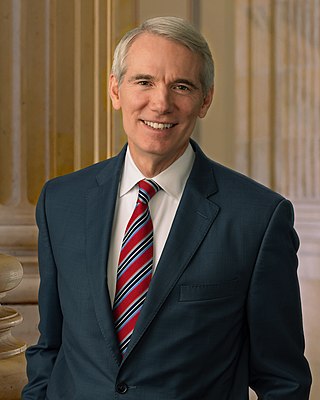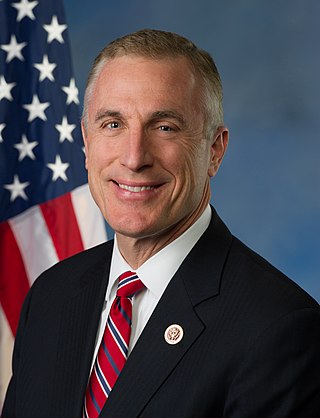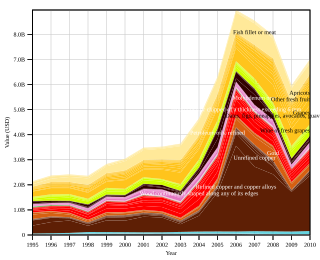
The Tariff Act of 1930, commonly known as the Hawley–Smoot Tariff or Smoot–Hawley Tariff, was a law that implemented protectionist trade policies in the United States. Sponsored by Senator Reed Smoot and Representative Willis C. Hawley, it was signed by President Herbert Hoover on June 17, 1930. The act raised US tariffs on over 20,000 imported goods.
The Morrill Tariff was an increased import tariff in the United States that was adopted on March 2, 1861, during the administration of US President James Buchanan, a Democrat. It was the twelfth of the seventeen planks in the platform of the incoming Republican Party, which had not yet been inaugurated, and the tariff appealed to industrialists and factory workers as a way to foster rapid industrial growth.

The Committee on Ways and Means is the chief tax-writing committee of the United States House of Representatives. The committee has jurisdiction over all taxation, tariffs, and other revenue-raising measures, as well as a number of other programs including Social Security, unemployment benefits, Medicare, the enforcement of child support laws, Temporary Assistance for Needy Families, foster care, and adoption programs. Members of the Ways and Means Committee are not allowed to serve on any other House Committee unless they are granted a waiver from their party's congressional leadership. It has long been regarded as the most prestigious committee of the House of Representatives.

Robert Jones Portman is an American attorney and politician who served as a United States senator from Ohio from 2011 to 2023. A member of the Republican Party, Portman was the 35th director of the Office of Management and Budget (OMB) from 2006 to 2007, the 14th United States trade representative from 2005 to 2006, and a U.S. representative from 1993 to 2005, representing Ohio's 2nd district.

The United States Senate Committee on Finance is a standing committee of the United States Senate. The Committee concerns itself with matters relating to taxation and other revenue measures generally, and those relating to the insular possessions; bonded debt of the United States; customs, collection districts, and ports of entry and delivery; deposit of public moneys; general revenue sharing; health programs under the Social Security Act and health programs financed by a specific tax or trust fund; national social security; reciprocal trade agreements; tariff and import quotas, and related matters thereto; and the transportation of dutiable goods. It is considered to be one of the most powerful committees in Congress.

Timothy Francis Murphy is an American former politician and psychologist who served as the U.S. representative for Pennsylvania's 18th congressional district from 2003 until his resignation in 2017. The district included several suburbs south of Pittsburgh. A member of the Republican Party, he also represented the 37th Senate district in the Pennsylvania State Senate from 1996 to 2003. Murphy consistently carried the 18th district with at least 58% of the vote, including unopposed re-election bids in 2014 and 2016.
The US-Morocco Free Trade Agreement is a bilateral trade agreement between the United States and Morocco. The agreement was signed on June 15, 2004, followed by U.S. President George W. Bush's signing of the USMFTA Implementation Act on August 17, 2004. The United States House of Representatives ratified the pact on July 22, 2004 by a 323–99 vote. The United States Senate passed the bill by unanimous consent on July 21, 2004. The Morocco FTA came into effect on January 1, 2006.
The U.S.-Oman Free Trade Agreement is a trade pact between Oman and the United States. On November 15, 2004, the George W. Bush administration notified the U.S. Congress of its intent to sign a trade agreement with the Middle Eastern Sultanate of Oman. On January 19, 2006 the two countries signed the U.S.-Oman Free Trade Agreement (OFTA), which is part of the Bush administration's strategy to create a US - Middle East Free Trade Area (MEFTA) by 2013.
The fast track authority for brokering trade agreements is the authority of the President of the United States to negotiate international agreements in an expedited manner and with limited congressional oversight. Renamed the trade promotion authority (TPA) in 2002, the TPA is an impermanent power granted by Congress to the President. It remained in effect from 1975 to 1994, pursuant to the Trade Act of 1974 and from 2002 to 2007 pursuant to the Trade Act of 2002. Although it technically expired in July 2007, it remained in effect for agreements that were already under negotiation until their passage in 2011. In June 2015, a third renewal passed Congress and was signed into law by President Barack Obama.

Sherrod Campbell Brown is an American politician serving as the senior United States senator from Ohio, a seat which he has held since 2007. A member of the Democratic Party, he was the U.S. representative for Ohio's 13th congressional district from 1993 to 2007 and the 47th secretary of state of Ohio from 1983 to 1991. He started his political career in 1975 as an Ohio state representative.

Erik Philip Paulsen is an American businessman and politician who represented Minnesota's 3rd congressional district in the United States House of Representatives from 2009 to 2019. A member of the Republican Party, he served in the Minnesota House of Representatives from 1995 to 2009 and as majority leader from 2003 to 2007.

Gerald Edward Connolly is an American politician serving as the U.S. representative for Virginia's 11th congressional district, first elected in 2008. The district is anchored in Fairfax County, an affluent suburban county south of Washington, D.C. It includes all of Fairfax City and part of Prince William County. Connolly is a member of the Democratic Party.
Freedom to Travel to Cuba Act is the name of three bills introduced into the United States Congress which would allow U.S. citizens to engage in unrestricted travel to Cuba for the first time since 1963.

The Credit Card Accountability Responsibility and Disclosure (CARD) Act of 2009 is a federal statute passed by the United States Congress and signed by U.S. President Barack Obama on May 22, 2009. It is a comprehensive credit card reform legislation that aims "to establish fair and transparent practices relating to the extension of credit under an open end consumer credit plan, and for other purposes." The bill was passed with bipartisan support by both the House of Representatives and the Senate.

The U.S.–China Relations Act of 2000 is an Act of the United States Congress that granted China permanent normal trade relations (NTR) status when China becomes a full member of the World Trade Organization (WTO), ending annual review and approval of NTR. It was signed into law on October 10, 2000, by United States President Bill Clinton. The Act also establishes a Congressional-Executive Commission to ensure that China complies with internationally recognized human rights laws, meets labor standards and allows religious freedom, and establishes a task force to prohibit the importation of Chinese products that were made in forced labor camps or prisons. The Act also includes so-called "anti-dumping" measures designed to prevent an influx of inexpensive Chinese goods into the United States that might hurt American industries making the same goods. It allows new duties and restrictions on Chinese imports that "threaten to cause market disruption to the U.S. producers of a like or directly competitive product."
The Currency Exchange Rate Oversight Reform Act of 2011 is an international trade bill in the 112th United States Congress that would establish US tariffs on imports from countries with undervalued currencies. The bill was approved by the Senate on October 11, 2011, by a vote of 63–35, with no vote yet coming from the House of Representatives. The bill calls for the Treasury Department to identify countries whose currencies are undervalued, and then instruct the Commerce Department to impose duties on imports from those aforementioned countries.

The United States-Chile Free Trade Agreement is a free trade agreement between the United States and Chile signed on June 6, 2003. The pact came into force on January 1, 2004. On that date, tariffs on 90% of U.S. exports to Chile and 95% of Chilean exports to the United States were eliminated. The agreement also established that Chile and the U.S. will establish duty-free trade in all products within a maximum of 12 years (2016). In 2009, bilateral trade between the United States and Chile reached US$15.4 billion, a 141% increase over bilateral trade levels before the U.S.-Chile FTA took effect. In particular, U.S. exports to Chile in 2009 showed a 248% increase over pre-FTA levels.

The Cyber Intelligence Sharing and Protection Act was a proposed law in the United States which would allow for the sharing of Internet traffic information between the U.S. government and technology and manufacturing companies. The stated aim of the bill is to help the U.S. government investigate cyber threats and ensure the security of networks against cyberattacks.

Peter Rey Aguilar is an American politician who has been chair of the House Democratic Caucus since 2023. He has been the U.S. representative for California's 33rd congressional district since 2015. He served as mayor of Redlands, California, from 2010 to 2014, and as the president of the Inland Empire Division of the League of California Cities. Aguilar served on the Redlands City Council from 2006 until his election to Congress.
The United States Senate Select Committee on the Tariff Regulation was a Select Committee for the U.S. Senate from February 25, 1823 until March 3, 1923. It is now a defunct congressional committee, having been consolidated into the Committee of Finance in 1923.










